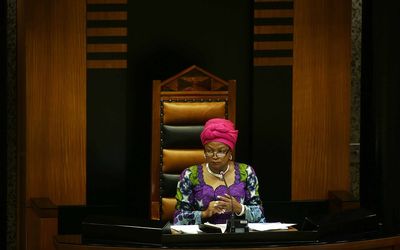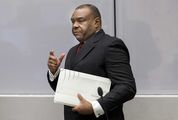SA must not confuse mob rule with democracy
by George Devenish,
2016-03-05 09:08:45.0
MOST South Africans were appalled by the conduct of MPs during the debate on the president’s state of nation address early in February. Parliament degenerated into a circus with speakers trading insults and the presiding officers appearing inept in their attempt to control unruly members, and giving irrational rulings that worsened the pandemonium that prevailed in the debate.
South Africans and honourable MPs need to reflect on what has occurred and get back to basics. The founding fathers who drafted the interim constitution on which the final Constitution of 1993 was modelled, retained the designation "parliament" for the legislature of a democratic SA. This term is inextricably connected to the mother of all parliaments, established more than 1,000 years ago at Westminster, the seat of the British parliament.
This legislature, designated as the institution of Parliament, has a celebrated lineage involving a heroic struggle against monarchical despotism and an intriguing and fascinating evolution culminating in a constitutional monarchy and a democratic body politic. It emerged as a historic exemplar and bastion of liberty, not only for the British people, but also for all nations applying a system of parliamentary government, as we do in SA. Parliamentary democracy as developed at Westminster is a universal legacy and a priceless heritage. SA has moved from a system involving a sovereign apartheid parliament to a democratic parliament operating in terms of an exemplary Constitution and a bill of rights.
Parliament’s manifold functions involve not only the making of laws, but ensuring that the government is by the people under the Constitution. It fulfils this cardinal function by electing the president, providing a national forum for public debate and the deliberation and consideration of all national political issues. This results in the passing of legislation as well as scrutinising, criticising and overseeing the conduct of the executive.
The pandemonium that prevailed in Parliament, and in particular the conduct of the Economic Freedom Fighters (EFF) and its leader in the manner in which he employed insulting language and highly personal comments in relation to the president in the debate, negated all the virtues that a system of parliamentary democracy stands for and indicates that something is seriously amiss in our body politic. Instead of attempting to hold the president to account using a rational discourse and robust debate, the EFF and its leaders demonised the head of state in a manner that did harm to the office of president and the image of Parliament itself.
What is, however, categorically clear is that the people of SA are alarmed and dismayed at what has occurred. It is totally unacceptable that reasoned debate should be replaced by irrational mud-slinging and the trading of insults in a venerable institution that is the highest debating forum in the land.
A great responsibility rests on the speaker and other presiding officers to maintain order and decorum in the chamber. The chief function of the speaker, who occupies a most distinguished office, is to preserve the privileges and dignity of Parliament. This must be done with manifest impartiality and courage. The speaker must be independent of the executive. Unfortunately, the way Baleka Mbete, as speaker, has conducted herself displays an abysmal understanding of the requirements of a historic and distinguished office, which has its genesis in mother of Parliament at Westminster.
As we have adopted a parliamentary system of government, its ethos and operation is relevant for the working of our system of parliamentary democracy. The office has an ancient lineage that was characterised by both dignity and fearless independence. It is in regard to the latter that Mbete and other presiding officers have failed so manifestly, by their blatant partiality to the African National Congress (ANC), involving, inter alia, an inability to protect the institution from the spurious points of order and correctly and impartially decide on what are and are not parliamentary terms.
It is submitted that the words "factions" and "rubbish" are not unparliamentary and decision of the presiding officer, Papi Tau of the National Council of Provinces (NCOP), in this regard was patently wrong and makes inroads into the freedom of speech that should prevail in Parliament.
The Democratic Alliance (DA) as the official opposition has a very responsible role to play in the present debacle in Parliament. However difficult this may be, it must attempt to effect some kind of reconciliation between conflicting interests and personalities by exercising a leadership role in relation to the other opposition parties and engaging the ANC. The conduct of the EFF, with its fascist tendencies, leaves a great deal to be desired in their language and conduct, which makes it difficult or virtually impossible for other parties to carry out their oversight role of the executive role by rational debate and discourse.
They appear hellbent on rendering Parliament ungovernable, which is in nobody’s interest. There is a fundamental difference between mob rule and democracy as there is between rabble rousing and reasoned and intelligent debate. It is imperative that the EFF and its leader accept that they are bound to submit to legitimate authority in Parliament and in their conduct elsewhere in the country.
This is fundamental to the rule of law and must be impressed on them in categorical and no uncertain terms. Nevertheless, members of the EFF should not be disciplined in a manner that violates due procedure or results in an abridgment of freedom of expression in Parliament. This is a great challenge to both the ANC government and the opposition parties.
It is further submitted that the electorate and people of SA are looking for statesmanlike conduct that will resolve the system of chronic crisis that has prevailed in Parliament. It is imperative that this be done immediately by effecting a reconciliation between different parties that are committed to rational debate and by devising a strategy to prevent the EFF from causing pandemonium that renders Parliament ungovernable.
The optimal working of parliament requires co-operation between government and opposition parties. The ANC must therefore take the lead to bring this about. If this is not done, SA and its fledgling democracy will lose and there will be frightening consequence for all concerned. There is no easy way out of the present crisis, so it is essential that political leadership with of the ANC, the DA other responsible parties rise to the occasion.
• Devenish is an emeritus professor at the Universith of KwaZulu-Natal and one of the scholars who assisted in drafting the interim constitution in 1993

POINT OF DISORDER: Speaker Baleka Mbete during a sitting of Parliament. Picture: THE TIMES
MOST South Africans were appalled by the conduct of MPs during the debate on the president’s state of nation address early in February. Parliament degenerated into a circus with speakers trading insults and the presiding officers appearing inept in their attempt to control unruly members, and giving irrational rulings that worsened the pandemonium that prevailed in the debate.
South Africans and honourable MPs need to reflect on what has occurred and get back to basics. The founding fathers who drafted the interim constitution on which the final Constitution of 1993 was modelled, retained the designation "parliament" for the legislature of a democratic SA. This term is inextricably connected to the mother of all parliaments, established more than 1,000 years ago at Westminster, the seat of the British parliament.
This legislature, designated as the institution of Parliament, has a celebrated lineage involving a heroic struggle against monarchical despotism and an intriguing and fascinating evolution culminating in a constitutional monarchy and a democratic body politic. It emerged as a historic exemplar and bastion of liberty, not only for the British people, but also for all nations applying a system of parliamentary government, as we do in SA. Parliamentary democracy as developed at Westminster is a universal legacy and a priceless heritage. SA has moved from a system involving a sovereign apartheid parliament to a democratic parliament operating in terms of an exemplary Constitution and a bill of rights.
Parliament’s manifold functions involve not only the making of laws, but ensuring that the government is by the people under the Constitution. It fulfils this cardinal function by electing the president, providing a national forum for public debate and the deliberation and consideration of all national political issues. This results in the passing of legislation as well as scrutinising, criticising and overseeing the conduct of the executive.
The pandemonium that prevailed in Parliament, and in particular the conduct of the Economic Freedom Fighters (EFF) and its leader in the manner in which he employed insulting language and highly personal comments in relation to the president in the debate, negated all the virtues that a system of parliamentary democracy stands for and indicates that something is seriously amiss in our body politic. Instead of attempting to hold the president to account using a rational discourse and robust debate, the EFF and its leaders demonised the head of state in a manner that did harm to the office of president and the image of Parliament itself.
What is, however, categorically clear is that the people of SA are alarmed and dismayed at what has occurred. It is totally unacceptable that reasoned debate should be replaced by irrational mud-slinging and the trading of insults in a venerable institution that is the highest debating forum in the land.
A great responsibility rests on the speaker and other presiding officers to maintain order and decorum in the chamber. The chief function of the speaker, who occupies a most distinguished office, is to preserve the privileges and dignity of Parliament. This must be done with manifest impartiality and courage. The speaker must be independent of the executive. Unfortunately, the way Baleka Mbete, as speaker, has conducted herself displays an abysmal understanding of the requirements of a historic and distinguished office, which has its genesis in mother of Parliament at Westminster.
As we have adopted a parliamentary system of government, its ethos and operation is relevant for the working of our system of parliamentary democracy. The office has an ancient lineage that was characterised by both dignity and fearless independence. It is in regard to the latter that Mbete and other presiding officers have failed so manifestly, by their blatant partiality to the African National Congress (ANC), involving, inter alia, an inability to protect the institution from the spurious points of order and correctly and impartially decide on what are and are not parliamentary terms.
It is submitted that the words "factions" and "rubbish" are not unparliamentary and decision of the presiding officer, Papi Tau of the National Council of Provinces (NCOP), in this regard was patently wrong and makes inroads into the freedom of speech that should prevail in Parliament.
The Democratic Alliance (DA) as the official opposition has a very responsible role to play in the present debacle in Parliament. However difficult this may be, it must attempt to effect some kind of reconciliation between conflicting interests and personalities by exercising a leadership role in relation to the other opposition parties and engaging the ANC. The conduct of the EFF, with its fascist tendencies, leaves a great deal to be desired in their language and conduct, which makes it difficult or virtually impossible for other parties to carry out their oversight role of the executive role by rational debate and discourse.
They appear hellbent on rendering Parliament ungovernable, which is in nobody’s interest. There is a fundamental difference between mob rule and democracy as there is between rabble rousing and reasoned and intelligent debate. It is imperative that the EFF and its leader accept that they are bound to submit to legitimate authority in Parliament and in their conduct elsewhere in the country.
This is fundamental to the rule of law and must be impressed on them in categorical and no uncertain terms. Nevertheless, members of the EFF should not be disciplined in a manner that violates due procedure or results in an abridgment of freedom of expression in Parliament. This is a great challenge to both the ANC government and the opposition parties.
It is further submitted that the electorate and people of SA are looking for statesmanlike conduct that will resolve the system of chronic crisis that has prevailed in Parliament. It is imperative that this be done immediately by effecting a reconciliation between different parties that are committed to rational debate and by devising a strategy to prevent the EFF from causing pandemonium that renders Parliament ungovernable.
The optimal working of parliament requires co-operation between government and opposition parties. The ANC must therefore take the lead to bring this about. If this is not done, SA and its fledgling democracy will lose and there will be frightening consequence for all concerned. There is no easy way out of the present crisis, so it is essential that political leadership with of the ANC, the DA other responsible parties rise to the occasion.
• Devenish is an emeritus professor at the Universith of KwaZulu-Natal and one of the scholars who assisted in drafting the interim constitution in 1993























Change: 1.19%
Change: 1.36%
Change: 2.19%
Change: 1.49%
Change: -0.77%
Data supplied by Profile Data
Change: -0.08%
Change: 0.12%
Change: 1.19%
Change: 0.00%
Change: 0.10%
Data supplied by Profile Data
Change: 0.30%
Change: 0.38%
Change: 0.42%
Change: 0.30%
Change: 0.58%
Data supplied by Profile Data
Change: 0.23%
Change: -0.31%
Change: 0.13%
Change: -0.33%
Change: 0.17%
Data supplied by Profile Data